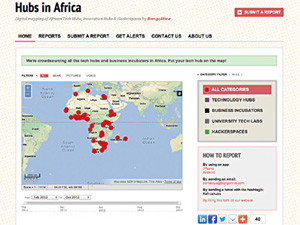
Since the establishment, in 2000, of the Bandwidth Barn (BWB) - an ICT business incubator that was formed out of the Cape IT Initiative (CITI) - a plethora of technology incubators, hubs and accelerators have appeared in the local industry. Johannesburg has the Innovation Hub, and its latest addition, JoziHub, while Cape Town - home to the majority of promising tech start-ups - has BWB and the Google-backed 88mph, among others.
While they all have differing approaches and offerings, their mandates are essentially the same: to bolster technology innovation and entrepreneurship in SA, and in some cases, Africa. They do this by striving to provide some or all of the resources that are critical to IT start-ups: seed capital, office space/infrastructure, bandwidth, networks and mentorship, at an affordable price. Yet while Africa has had one or two success stories - most notably the iHub in Kenya - many question whether any of SA's enterprise development initiatives do more than just make the right noises.
We're getting a thrashing from the rest of Africa and the rest of the world.
When it comes to start-ups, one metric that's certainly relevant is survival. In this regard, the BWB has been a success. The CT-based organisation is arguably the country's poster child for technology incubators. It's been in existence for well over a decade, fostering a steady stream of IT businesses in the Western Cape, which is undoubtedly the country's top-performing province with regards to tech innovation. Where the BWB appears to have had the most impact is in enabling fledgling businesses to survive the hazardous inception phase by providing access to shared space, infrastructure and mentorship. According to an external report on the BWB's impact, it does 'exceptionally well' in 'preserving companies'.
"In most years after inception, the Bandwidth Barn's tenants and graduates are two to 2.5 times more likely to have survived than the average Western Cape ICT start-up in the same cohort," the report states. In addition, survey respondents in the start-up phase indicated that the odds of success of their businesses so far would have been 20% without the support of the Barn. "In effect, these companies ascribe 80% of their chances of survival to the assistance of the BWB," reads the report.
Yet despite the relative success of the BWB in pursuing its mission, as well as the efforts of SA's newly established hubs and accelerators, Jenny McKinnell, group executive director of the Cape IT Initiative and the BWB, says that, as a country, we're lagging further and further behind with regards to growth and innovation.
"We're getting a thrashing from the rest of Africa and the rest of the world," she says. "According to research out of Harvard Business School, the Western Cape region should be generating up to 30 high-growth businesses a year - and we're far from that. If anything, we have more challenges in IT than we've ever had before, with massive off-shoring of local talent, the acceleration of big corporates moving their businesses and opportunities out of the country, and local IT products and software failing to be commercialised because of the lack of government support."
Tech hubs for Africa
IT hubs are popping up in Africa at an impressive rate. According to Venture Capital for Africa, a new African hub is launched nearly every two weeks.
The BBC has reported that there are more than 50 tech hubs, labs, incubators and accelerators in Africa, covering over 20 countries. At last count, in October 2012, africahubs.crowdmap.com reported that there were 73 technology hubs, 63 business incubators, 13 university tech labs and 18 hackerspaces throughout Africa.
This certainly paints a grim picture of the local scene, but one that the private sector is actively trying to improve. Many are optimistic that development initiatives such as IT hubs and incubators can fill the gap in terms of mentorship and infrastructure, which SA lacks by the bucket-load. While local hubs are still in their infancy, several have the backing of global tech giants such as Microsoft and Google. Says Steven Ambrose, MD of IT consultancy Strategy Worx: "Africa no longer has a bandwidth issue; it has an infrastructure issue that hampers the delivery of the available bandwidth to the user. Hubs facilitate this and allow peer learning and assistance from companies such as Microsoft."
As part of its $70 million Microsoft4Afrika Initiative, which seeks to upskill 200 000 Africans in IT fields, the software company is launching an online hub called SME4Afrika. Kresten Buch, the founder of 88mph, believes that by working together, incubators, hubs and accelerators can provide SA with a much-needed technology 'ecosystem'.
Africa no longer has a bandwidth issue; it has an infrastructure issue that hampers the delivery of the available bandwidth to the user.
"Although they all fulfil different roles, each one is important and helps to pull people and resources together," he adds. With our dismally high failure rate among start-ups, SA's entrepreneurs certainly need all the help they can get.
First published in May 2013 edition of ITWeb's Brainstorm magazine.
* Article first published on brainstorm.itweb.co.za
Share